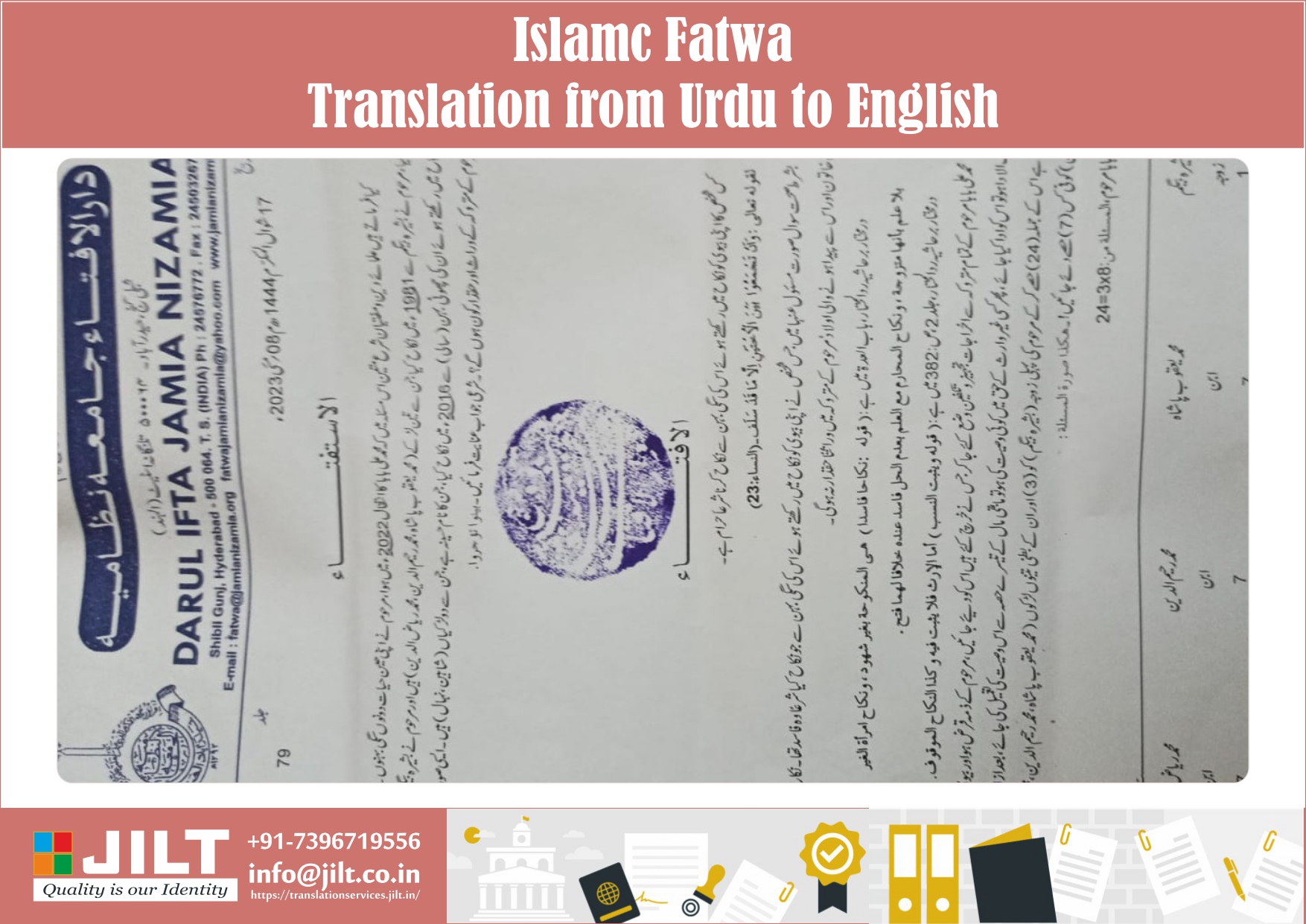
IMPORTANCE OF ISLAMIC FATWA TRANSLATION FROM URDU TO ENGLISH
by Dr. Abu Mazhar Khalid Siddique - July 05, 2023
Introduction
Islamic Fatwas are legal opinions provided by religious scholars to guide Muslims in matters of faith and practice. As Urdu is a widely spoken language in the Islamic world, translating and attesting Fatwas from Urdu to English is crucial for ensuring their accessibility and understanding by a global audience. In this blog post, we will explore the significance of accurate translation and attestation of Islamic Fatwas, and how it aids in promoting cross-cultural understanding, facilitating legal compliance, and fostering harmony in diverse communities.
Bridging the Language Barrier
Islamic Fatwas hold immense significance in guiding the lives of millions of Muslims worldwide. However, many Fatwas are originally issued in languages such as Urdu, which can limit their reach to non-Urdu speaking Muslims and non-Muslims alike. Translation plays a pivotal role in breaking these language barriers and making Fatwas accessible to a wider audience.
By translating Fatwas from Urdu to English, non-Urdu speaking Muslims can gain access to authoritative religious guidance, enabling them to make informed decisions regarding religious practices, rituals, and daily life matters. Additionally, non-Muslim individuals, scholars, researchers, and policymakers who seek to understand Islamic teachings and practices can also benefit from translated Fatwas, fostering interfaith dialogue and mutual understanding.
Ensuring Accuracy and Authenticity
Accurate translation is essential when it comes to Islamic Fatwas, as they carry significant weight and influence over religious practices. A slight mistranslation or misinterpretation can lead to misunderstandings, confusion, and even potential misapplication of Islamic teachings. To maintain the integrity of Fatwas, professional translators with expertise in both Urdu and English, as well as a profound understanding of Islamic theology, must handle the translation process.
Attestation further enhances the reliability and authenticity of translated Fatwas. It involves the verification of the translated document by recognized religious authorities or institutions. Attested Fatwas provide an assurance that the translation faithfully represents the original meaning and intention of the issuing scholars. This process safeguards against any potential manipulation or misrepresentation that may occur during translation.
Promoting Legal Compliance
Islamic Fatwas often deal with matters of religious law, which can have legal implications in various contexts. When these Fatwas are translated and attested in English, it allows individuals, communities, and organizations adhere to legal requirements while following Islamic principles.
For Muslims residing in English-speaking countries, translated and attested Fatwas assist in navigating legal systems, while ensuring compliance with both civil laws and Islamic guidelines. It helps Muslims understand how their religious obligations align with local regulations and customs, avoiding any inadvertent violations and promoting harmony within society.
Moreover, legal professionals, judges, and policymakers can utilize translated Fatwas to gain insights into Islamic jurisprudence and religious perspectives, assisting them in making informed decisions and formulating laws that respect and accommodate the needs of diverse populations.
Fostering Cross-Cultural Understanding
Translation and attestation of Islamic Fatwas contribute to the promotion of cross-cultural understanding and harmony in multicultural societies. As English serves as a global common language, translating Fatwas into this widely spoken language opens doors for intercultural dialogue and cooperation.
By making Islamic Fatwas accessible to non-Muslims in English-speaking countries, it helps dispel misconceptions and stereotypes about Islam. Non-Muslims can gain a more in-depth understanding of Islamic teachings, religious practices, and the principles that guide the lives of Muslims. This knowledge promotes tolerance, respect, and empathy, fostering peaceful coexistence and reducing cultural and religious biases.
Conclusion
The translation and attestation of Islamic Fatwas from Urdu to English play a pivotal role in ensuring their accessibility, accuracy, and legal compliance. By bridging language barriers, maintaining authenticity, facilitating legal understanding, and promoting cross-cultural dialogue, these processes empower individuals, communities, and societies to better understand and practice Islam in accordance with their cultural and legal contexts. As we continue to foster global connections and build diverse communities, accurate translation and attestation of Islamic Fatwas contribute to harmony, mutual respect, and interfaith understanding on a broader scale.
Our company has a team of translators who can quickly and accurately translate and have the translation attested, if needed, for all languages. We translate into English, Urdu, Arabic, Spanish, German, Persian, French, Japanese, Italian, Korean, Russian, and all other Indians and local languages. Our professional proofreaders will check out the translation. We also offer a courier service to send finished documents to our customer’s addresses.
- Also Read :- THE IMPORTANCE AND USES OF DEATH CERTIFICATE TRANSLATION FROM ENGLISH TO GERMAN
- Also Read :- VALUE OF A K S A DRIVING LICENSE AND ITS TRANSLATION FROM ARABIC TO ENGLISH
- Also Read :- INTERNATIONAL TRANSLATION DAY: BRIDGING CULTURES AND CONNECTING THE WORLD
- Also Read :- Police check translations (JILT - Certified Translation Services)
- Also Read :- The Art of Transcreation: Moving Beyond Literal Translation
- Also Read :- THE SIGNIFICANCE AND EMERGING TRENDS IN GLOBAL MARKET STATISTICS
- Also Read :- MULTILINGUAL SEO – ITS TECHNICAL CONSIDERATIONS
- Also Read :- GMP (Good Manufacturing Practice) Certificate Translation Services
- Also Read :- Professional language translation services \\r\\nCan help improve a company’s image.
- Also Read :- Translation and localization services for manufacturing
Search
Categories
Archives by Month
Popular Blog
QUICK TRANSLATION QUOTE
Need help with a translation?
Get in touch with us
Whether you have a specific project you want to discuss, need a translation quote or simply want to discuss your requirements, do not hesitate to get in touch with us.











Social Networks